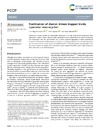Please use this identifier to cite or link to this item:
https://accedacris.ulpgc.es/jspui/handle/10553/74701
| DC Field | Value | Language |
|---|---|---|
| dc.contributor.author | Azofra Mesa, Luis Miguel | en_US |
| dc.contributor.author | Elguero, José | en_US |
| dc.contributor.author | Alkorta, Ibon | en_US |
| dc.date.accessioned | 2020-10-13T12:46:10Z | - |
| dc.date.available | 2020-10-13T12:46:10Z | - |
| dc.date.issued | 2020 | en_US |
| dc.identifier.issn | 1463-9076 | en_US |
| dc.identifier.other | Scopus | - |
| dc.identifier.uri | https://accedacris.ulpgc.es/handle/10553/74701 | - |
| dc.description.abstract | Interanionic H-bonds (IAHBs) are unfavourable interactions in the gas phase becoming favoured when anions are in solution. Dianion dimers are also susceptible to being trapped inside the cavities of cyanostar (CS) macrocycles, and thus, the formation of 2 : 2 anion : cyanostar aggregates is mainly supported by three kinds of interactions: IAHBs between the dianions, π-π stacking between the confronted cyanostars, and the presence of an intricate network of multiple C(sp2)HO H-bonds between cyanostar ligands and the anionic moieties. An analysis of the interaction energies supported by NBO reveals a slight cooperative effect of the CSs on the IAHB stabilisation. | en_US |
| dc.language | eng | en_US |
| dc.relation.ispartof | Physical Chemistry Chemical Physics | en_US |
| dc.source | Physical Chemistry Chemical Physics [EISSN 1463-9084], v. 22 (20), p. 11348-11353, (Mayo 2020) | en_US |
| dc.subject | 2307 Química física | en_US |
| dc.title | Stabilisation of dianion dimers trapped inside cyanostar macrocycles | en_US |
| dc.type | info:eu-repo/semantics/Article | en_US |
| dc.type | Article | en_US |
| dc.identifier.doi | 10.1039/D0CP01321H | en_US |
| dc.identifier.scopus | 85085536137 | - |
| dc.contributor.authorscopusid | 55142490200 | - |
| dc.contributor.authorscopusid | 35474081900 | - |
| dc.contributor.authorscopusid | 7005819296 | - |
| dc.identifier.eissn | 1463-9084 | - |
| dc.description.lastpage | 11353 | en_US |
| dc.identifier.issue | 20 | - |
| dc.description.firstpage | 11348 | en_US |
| dc.relation.volume | 22 | en_US |
| dc.investigacion | Ciencias | - |
| dc.type2 | Artículo | en_US |
| dc.description.numberofpages | 6 | en_US |
| dc.utils.revision | Sí | - |
| dc.date.coverdate | Mayo 2020 | en_US |
| dc.identifier.ulpgc | Sí | - |
| dc.contributor.buulpgc | BU-BAS | en_US |
| dc.description.sjr | 1,053 | |
| dc.description.jcr | 3,676 | |
| dc.description.sjrq | Q1 | |
| dc.description.jcrq | Q1 | |
| dc.description.scie | SCIE | |
| item.fulltext | Con texto completo | - |
| item.grantfulltext | open | - |
| crisitem.author.dept | GIR IUNAT: Fotocatálisis y espectroscopía para aplicaciones medioambientales. | - |
| crisitem.author.dept | IU de Estudios Ambientales y Recursos Naturales | - |
| crisitem.author.orcid | 0000-0003-4974-1670 | - |
| crisitem.author.parentorg | IU de Estudios Ambientales y Recursos Naturales | - |
| crisitem.author.fullName | Azofra Mesa, Luis Miguel | - |
| Appears in Collections: | Artículos | |
SCOPUSTM
Citations
19
checked on Jun 8, 2025
WEB OF SCIENCETM
Citations
20
checked on Feb 8, 2026
Page view(s)
70
checked on Jan 10, 2026
Download(s)
119
checked on Jan 10, 2026
Google ScholarTM
Check
Altmetric
Share
Export metadata
Items in accedaCRIS are protected by copyright, with all rights reserved, unless otherwise indicated.
